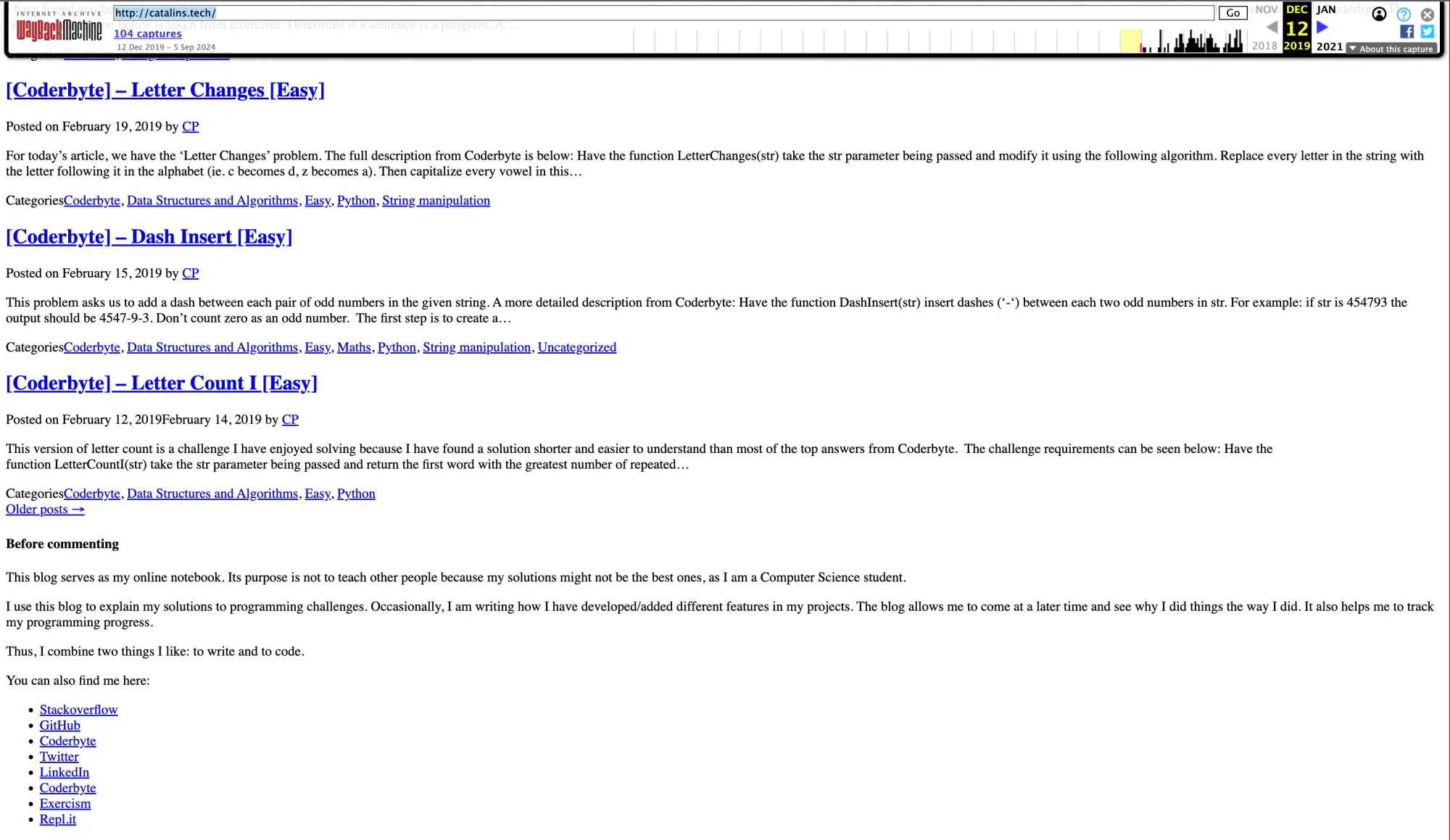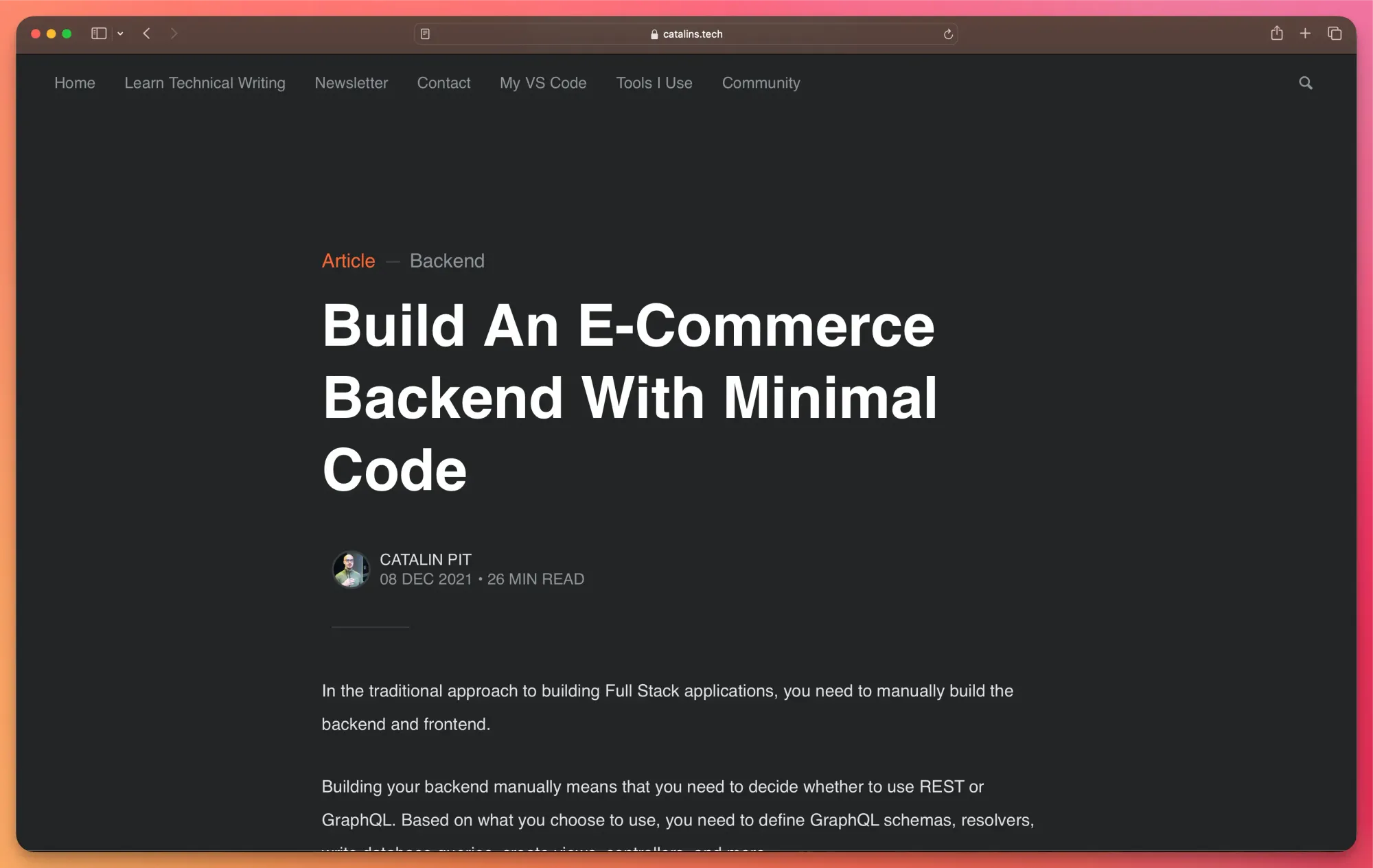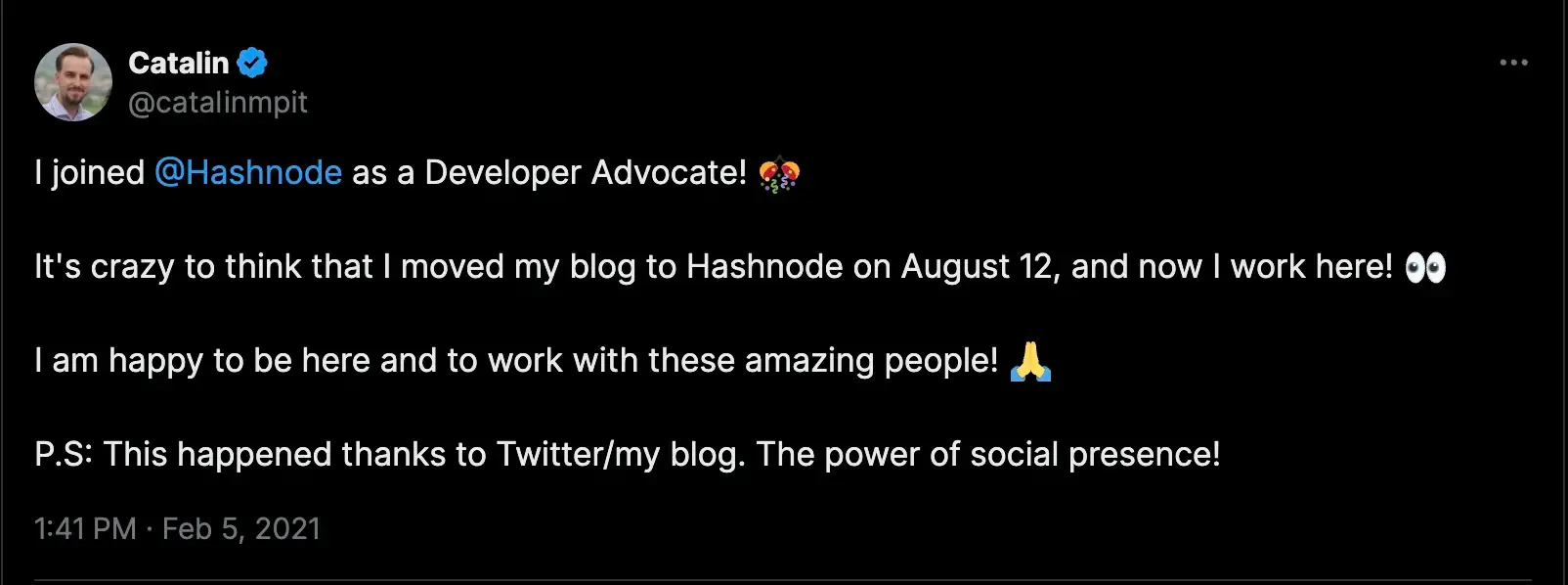and the distribution of digital products.
How I Landed 4 Jobs and Earned $25K+ With Technical Writing
\
Table of Contents- My Technical Writing Journey
- The Results of Technical Writing
- You Can Learn It Too
As a final-year university student preparing to enter the industry, I knew I had to differentiate myself from other candidates in a competitive job market. That's when the idea struck me: what if I combined two activities I enjoy, programming and writing?
\ Combining programming and writing would bring three significant benefits. First of all, publishing my code online would help me consolidate the information in my brain. They say that "to teach is to learn twice." Secondly, others can find my code and hopefully learn something from it (or give me feedback to improve my skills). Lastly, it would showcase my thinking process and soft skills, such as communication skills, to prospective employers.
\ With this goal and benefits in mind, I began my journey into technical writing by launching the website catalins.tech. The image from the Internet Archive shows the very first posts that I published.
\
\ As an aside, the excerpt from the bottom of my blog validates the things I've been saying about my passion for coding and writing:
\
Before commenting
\ This blog serves as my online notebook. Its purpose is not to teach other people because my solutions might not be the best ones, as I am a Computer Science student.
\ I use this blog to explain my solutions to programming challenges. Occasionally, I am writing how I have developed/added different features in my projects. The blog allows me to come at a later time and see why I did things the way I did. It also helps me to track my programming progress.
\ Thus, I combine two things I like: to write and to code.
\ Initially, my goal was to share my solutions to interview questions and coding challenges.
\ But as I continued publishing content, I increasingly enjoyed the dopamine rush of pressing the "publish" button. This made me go beyond coding challenges and interview questions. I began writing about:
\
My software development career, including topics like interview preparation and dealing with impostor syndrome, for example
The side projects I built in my free time
Career guidance for fellow developers
Useful resources for developers
\
I kept writing about everything related to technology and a career in this industry. As I published more articles, my work started gaining traction and getting noticed.
\ Tech publications like FreeCodeCamp and SitePoint, to name a few, invited me to publish on their platforms. These opportunities marked an important milestone in my technical writing journey. When I started writing, it was to stand out in job applications and reinforce the concepts I was learning. I never thought I'd publish on sites with hundreds of thousands, maybe even millions, of monthly readers, especially considering that English is my second language. It felt good and validated my writing skills.
\ Collaborating with these publications changed the trajectory of my journey. It helped me expand my reach, build credibility within the tech community, and level up my writing skills. Having to adapt to various style guides and working alongside other talented writers helped me improve my writing tenfold.
The Results of Technical WritingBut it gets even better.
\ Consistently publishing on my site and contributing to popular tech publications eventually led to my first paid technical writing gigs. I went from a random guy publishing on the internet to being paid to write technical articles.
\
\ According to my memory, these were my first earnings from technical writing. As far as I can recall, the $1,170 represents the total amount for four articles. When the money hit my bank account, I was over the moon!
\ After landing my first paid technical articles, finding these opportunities became easier and easier. Companies and publications started reaching out to me after discovering my work online, and people began recommending me to others. At one point, I earned more from these side gigs than my regular salary. Fast forward to today, and technical writing has helped me earn more than $25,000.
\ Don't get me wrong. I'm not trying to brag or show off here. I want to show that technical writing can be a lucrative and beneficial skill. I had no idea until I got into it myself.
\ But that's not at all. Sure, earning a generous income on the side is nice, but technical writing has also played a huge role in landing jobs. No exaggeration. It played a big part in landing 2 Developer Relations (DevRel) jobs and 2 engineering roles.
\ I'm not going to talk about all those roles, but here's an example of the interview assignment for my DevRel role at Hasura.
\
\ Similarly, here's the announcement from when I joined Hashnode, where my writing played a bigger role since it is a blogging platform, and I am a big advocate for writing as a developer.
\
\ You may say that technical writing is relevant for Developer Relations (DevRel) roles since they involve creating and publishing content online. However, my experience has shown that technical writing also played an important role in helping me land engineering roles.
\ Many developers tend to focus only on their coding skills while neglecting soft skills such as communication. However, coding is just one aspect of software development. In reality, you likely spend a good percentage of your working hours communicating with various stakeholders, including clients, team members, managers, and others. You also document your code and processes, write changelogs, and create documentation, among other tasks.
\ Communication is a very important skill, yet many engineers often overlook it. You know this is true if you've worked in a team of more than a few people.
\ Having understood that, I took a different route than most engineers. Instead of focusing solely on my technical skills, I split my time and priorities in a way that allowed me to work on my soft skills. I started this site and published articles about the projects I was working on, the technologies and concepts I was learning, and the challenges I faced as an engineer. I also shared my experiences, insights, and lessons learned. In fewer words, I wrote about anything and everything related to tech and my tech career.
\ When it came to finding new jobs and interviewing with companies, my technical writing skills and portfolio helped me stand out from the other candidates. They not only showcased my technical expertise but also my ability to communicate. They served as concrete examples of my thought process, work ethic, ability to articulate ideas, and expertise. Instead of having to "sell" myself to potential employers, they did most of the work for me.
\ I'm not trying to show off or brag, and I'll stop here so I don't become annoying. The bottom line is that my technical writing skills, and this site subsequently, opened doors to many opportunities, propelled my career forward, and helped me grow as an engineer.
\ These experiences made me realize the potential writing can have in one's career.
You Can Learn It TooOne of the best things about technical writing is that it has a low entry barrier and is also a low-friction activity. You can start a website like this and begin publishing articles right away.
\ You can write about the projects you're working on, the technologies and concepts you're learning, or the challenges you're facing as an engineer. The idea is to start writing and keep writing consistently. As you write more, you'll naturally improve your writing skills and find your voice.
\ Here are a few tips to help you get started:
\
Pick a domain: The first step is buying a domain. By having a personal domain, you maintain complete ownership and control over your content, reap the full SEO benefits of your work, and build and promote your brand.
\
Choose a platform: There are many platforms available for starting a website or blog, such as WordPress, Medium, GitHub Pages, and Ghost, to name just a few. Or you can even build a custom site. Pick one that suits your needs and allows you to use your personal domain.
Personally, I have used Ghost for a while, and it's one of the best solutions for a personal site. I wrote about how to get started with Ghost by self-hosting it on DigitalOcean.
\
Identify your topics: List topics you're passionate about or have experience with. These could be specific technologies, programming languages, tools, or even soft skills related to your career in tech. You can write about:
Your learnings. Did you learn something new? Write about it.
Your expertise. Are you an expert in a specific area? Write about it.
The issues you solve. Did you solve an issue? Write about it.
Your experiences. Have you gone through an interview, got a job, or got promoted? Write about it.
\
Write, edit, and publish: Set aside dedicated time for writing. Start writing, and don't worry about anything else. Your main priority is to dump the ideas from your brain. Then, revise and edit your article until you're satisfied with the content. Finally, hit the publish button.
\
It's important to remember that technical writing is a skill that improves with practice. The more you write, the better you'll become at writing. As you consistently publish articles, you'll build a valuable portfolio that showcases your technical writing skills.
\ Regularly writing about technical topics will deepen your understanding of those topics. The process of researching, organizing, and articulating your ideas will reinforce your knowledge and help you identify and fill knowledge gaps.
\ In addition to that, it will also improve your communication abilities. As you practice conveying and breaking down complex concepts, you'll become more effective at communication, which is an underrated and valuable skill in the tech industry.
\ Lastly, a portfolio of technical articles can open doors to new opportunities. Your writing serves as concrete examples of your abilities and expertise. Potential employers or clients can discover your work and understand the value you can bring. Your articles can also establish you as a thought leader in your field, attracting invitations to speak at conferences or contribute to publications.
\ The benefits you reap from technical writing will compound over time, propelling your career forward and opening up new opportunities.
\ If you want to explore technical writing more in-depth, I recently released a technical writing course for developers. This course teaches you the technical writing basics, including how to structure your writing effectively, use appropriate language and tone, and incorporate visuals to enhance your message.
\ You'll also learn various techniques for generating unlimited content ideas and establishing a solid reputation by publishing your content on high-quality, high-authority platforms and gaining exposure and credibility. But that's not all. The course explores many more topics, such as making money with technical writing and translating your articles into videos, to name a few.
\ You may say, "Did I read until now just to have you sell me a course?" The answer is no. I've been writing about technical writing and blogging long before having a course.
- Home
- About Us
- Write For Us / Submit Content
- Advertising And Affiliates
- Feeds And Syndication
- Contact Us
- Login
- Privacy
All Rights Reserved. Copyright , Central Coast Communications, Inc.



